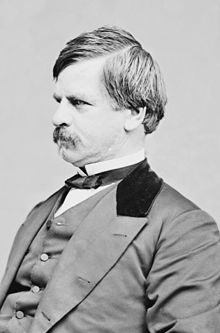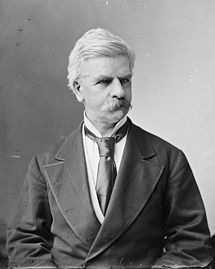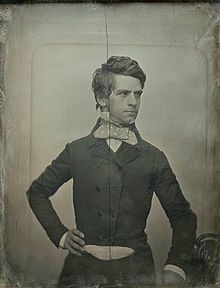- Nathaniel P. Banks
-
Nathaniel Prentice Banks 
25th Speaker of the United States House of Representatives In office
February 2, 1856 – March 4, 1857Preceded by Linn Boyd Succeeded by James L. Orr 24th Governor of Massachusetts In office
January 7, 1858 – January 3, 1861Lieutenant Eliphalet Trask Preceded by Henry Gardner Succeeded by John A. Andrew Member of the U.S. House of Representatives
from Massachusetts's 7th districtIn office
March 4, 1853 – December 24, 1857Preceded by John Z. Goodrich Succeeded by Daniel W. Gooch Member of the U.S. House of Representatives
from Massachusetts's 6th districtIn office
December 4, 1865 – March 3, 1873Preceded by Daniel W. Gooch Succeeded by Benjamin F. Butler Member of the U.S. House of Representatives
from Massachusetts's 5th districtIn office
March 4, 1875 – March 3, 1879Preceded by Daniel W. Gooch Succeeded by Selwyn Z. Bowman Member of the U.S. House of Representatives
from Massachusetts's 5th districtIn office
March 4, 1889 – March 3, 1891Preceded by Edward D. Hayden Succeeded by Sherman Hoar Personal details Born January 30, 1816
Waltham, MassachusettsDied September 1, 1894 (aged 78)
Waltham, MassachusettsPolitical party Democratic
American
RepublicanSpouse(s) Mary Theodosia Palmer Profession Elected offices, Military, U.S. marshal Signature 
Military service Allegiance  Union
UnionService/branch Union Army Years of service 1861–1865 Rank  Major General
Major GeneralCommands *V Corps - II Corps
- Army of the Gulf
Battles/wars American Civil War Nathaniel Prentice (or Prentiss)[1] Banks (January 30, 1816[2] – September 1, 1894[3]) was an American politician and soldier, served as the 24th Governor of Massachusetts, Speaker of the U.S. House of Representatives and as a Union general during the American Civil War.
Contents
Early life
Banks was born at Waltham, Massachusetts, the first child of Nathaniel P. Banks, Sr., and Rebecca Greenwood Banks.[4] He received only a common school education and at an early age began work as a bobbin boy in a local cotton factory; throughout his life he was known by the humorous nickname, Bobbin Boy Banks. Subsequently, he apprenticed as a mechanic alongside Elias Howe; briefly edited several weekly newspapers; studied law with political mentor Robert Rantoul and was admitted to the bar at age 23, his energy and his ability as a public speaker soon winning him distinction. His booming, distinctive voice and oracular style of delivery made him a commanding presence before an audience. On April 11, 1847, at Providence, Rhode Island,[5] he married Mary Theodosia Palmer, an ex-factory employee, after a lengthy courtship.[6]
Political career
Banks served as a Democrat in the Massachusetts House of Representatives from 1849 to 1853, and was speaker in 1851 and 1852; he was president of the state Constitutional Convention of 1853, and in the same year was elected to the United States House of Representatives as a coalition candidate of Democrats and Free-Soilers. In 1854, he was reelected as a Know Nothing.
At the opening of the Thirty-Fourth Congress, men from several parties opposed to slavery's spread gradually united in supporting Banks for speaker, and after the longest and one of the most bitter speakership contests ever, lasting, from December 3, 1855 to February 2, 1856, he was chosen on the 133rd ballot. This has been called the first national victory of the Republican party. He gave antislavery men important posts in Congress for the first time, and cooperated with investigations of both the Kansas conflict and the caning of Senator Charles Sumner. Yet, he also left a legacy of fairness in his appointments and decisions. He played a key role in 1856 in bringing forward John C. Frémont as a moderate Republican presidential nominee. As a part of this process, Banks declined, as pre-arranged, the presidential nomination of those Know-Nothings, opposed to the spread of slavery, in favor of Republican Frémont. For the next few years, Banks was supported by a coalition of Know-Nothings and Republicans in Massachusetts. His interest in the Know-Nothing legislative agenda was minimal, supporting only some tougher residency requirements for voting.
Re-elected in 1856 as a Republican, he resigned his seat in December 1857, and was governor of Massachusetts from 1858 to 1860, during a period of government contraction forced by the depression of those years. He made a serious attempt to gain the Republican presidential nomination in 1860, but discord within his party in Massachusetts, a residence in a "safe" Republican state, and his Know-Nothing past doomed his chances. He then was briefly resident director in Chicago, Illinois, of the Illinois Central Railroad, hired primarily to promote sale of the railroad's extensive lands.
Civil War
As the Civil War became imminent, President Abraham Lincoln considered Banks for a cabinet post, and eventually chose him as one of the first major generals of volunteers, appointing him on May 16, 1861. Perceptions that the Massachusetts militia was well organized and armed at the beginning of the Civil War likely played a role in the appointment decision, as Banks had also been considered for quartermaster general. He was initially resented by many of the generals who had graduated from the United States Military Academy, but Banks brought political benefits to the administration, including the ability to attract recruits and money for the Federal cause.
First command
Banks first commanded at Annapolis, Maryland, suppressing support for the Confederacy in a slave-holding state that was at risk of seceding, then was sent to command on the upper Potomac when Brig. Gen. Robert Patterson failed to move aggressively in that area.
The Shenandoah Valley Campaign
When Maj. Gen. George B. McClellan entered upon his Peninsula Campaign in spring 1862, the important duty of keeping the Confederate forces of Stonewall Jackson in the Shenandoah Valley from reinforcing the defenses of Richmond fell to the two divisions commanded by Banks. When Banks's men reached the southern Valley at the end of a difficult supply line, the president recalled them to Strasburg, Virginia, at the northern end. Jackson then marched rapidly down the adjacent Luray Valley, driving Banks's retreating men from Winchester, Virginia, on May 25, and north to the Potomac River. Jackson's campaign of maneuver and lightning strikes against superior forces in the Valley—under Banks and other Union generals—humiliated the North and made him one of the most famous generals in American history.
On August 9, Banks again encountered Jackson at Cedar Mountain, in Culpeper County, and attacked him to gain early advantage, but a Confederate counterattack led by A.P. Hill repulsed Banks's corps and won the day. The arrival at the end of the day of Union reinforcements under Maj. Gen. John Pope, as well as the rest of Jackson's men, resulted in a two-day stand-off there. The Northern newspapers provided flattering versions of Banks's performance while Southern newspapers called the battle a Southern victory.
The Army of the Gulf
Banks next received command of the defense forces at Washington. In November 1862 he was asked to organize a force of thirty thousand new recruits, drawn from New York and New England. As a former governor of Massachusetts, he was politically connected to the governors of these states, and the recruitment effort was successful. In December he sailed from New York with a this large force of raw recruits to replace Maj. Gen. Benjamin Butler at New Orleans, Louisiana, as commander of the Department of the Gulf.
According to the historian John D. Winters of Louisiana Tech University in The Civil War in Louisiana (1963), "Butler hated Banks and was jealous of his political success and his 'reputation of being the best general selected from civil life.'"[7] Nevertheless, Butler, "swallowing his bitter pill with a show of good grace" welcomed Banks to New Orleans and briefed him on civil and military affairs of importance. Gideon Welles, secretary of the navy, doubted the wisdom of replacing Butler [a later Massachusetts governor] with Banks. According to historian Winters, "Welles's opinion of the military abilities of both men was very low, but he did not question Butler's skill as a 'police magistrate' in charge of civil affairs. Banks, he thought did not have 'the energy, power or ability of Butler.' He did have 'some ready qualities for civil administration,' but was less reckless and unscrupulous' and probably would not be able to hold a tight enough rein on the people" once placed under Union control."[7]
Mrs. Banks joined her husband in New Orleans and held lavish dinner parties for the benefit of Union soldiers and their families. On April 12, 1864, she played the role of the "Goddess of Liberty" surrounded by all of the states of the reunited country. She did not then know of her husband's unhappy fate at the Battle of Mansfield just three days earlier. By July 4, 1864, however, New Orleans had recovered from the Red River Campaign to hold another mammoth concert extolling the Union.[8]
Banks issued orders to his men prohibiting pillage, but the undisciplined troops had chosen to disobey them, particularly when near a prosperous plantation. A soldier of the New York 114th wrote: "The men soon learned the pernicious habit of slyly leaving their places in the ranks when opposite a planter's house. ... Oftentimes a soldier can be found with such an enormous development of the organ of destructiveness that the most severe punishment cannot deter him from indulging in the breaking of mirrors, pianos, and the most costly furniture. Men of such reckless disposition are frequently guilty of the most horrible desecrations."[9]
Under orders to ascend the Mississippi River to join forces with Ulysses S. Grant, who was then trying to capture Vicksburg, Banks first pushed a Confederate force up the Teche Bayou and marched to Alexandria, Louisiana, hauling off slaves, cotton, and cattle from a rich agricultural area.
Siege of Port Hudson
When the Confederates reduced their garrison at Port Hudson, Louisiana, on the Mississippi, he invested that place in May 1863. Two attempts to carry the works by storm during the Siege of Port Hudson, as at Vicksburg, were dismal failures. Port Hudson was the first time African American soldiers were used in a major Civil War battle, as permitted by Banks. Low on food and ammunition, the garrison surrendered on July 9, 1863, after receiving word that Vicksburg had fallen. The entire Mississippi River was then under Union control.
In the autumn of 1863, Banks organized two seaborne expeditions to Texas, chiefly for the purpose of preventing the French in Mexico from aiding the Confederates or occupying Texas. He eventually secured possession of the region near the mouth of the Rio Grande and the Texas outer islands.
Red River Campaign
In 1863 Chief of Staff Henry Halleck continually promoted to Banks the Red River Campaign, and implied that the other major commanders favored the expedition. Banks in 1863 had disagreed with the Red River plan, hoping instead to mount sea expeditions to capture the Galveston area and Mobile. His superior, Ulysses S. Grant, considered it a strategic distraction, as he wanted Banks to drive east to capture Mobile, Alabama, as part of a coordinated series of offensives in the spring of 1864. When preparations for the 1864 Red River expedition were far advanced, Halleck wrote Banks he was withdrawing any suggestion as to action after receiving from Banks a detailed negative report about the operation. There is no evidence Halleck provided the negative report on the Red River to Grant, who was being asked for input on overall operations at the time. Halleck began referring to the Red River expedition as Banks's plan in keeping with an established pattern of deflecting responsibility.
The campaign lasted from March–May 1864; Banks' army was routed at the Battle of Mansfield by General Richard Taylor (son of former President Zachary Taylor) and retreated 20 miles to make a stand the next day at the Battle of Pleasant Hill. They continued the retreat to Alexandria, where they rejoined with part of the Federal Inland Fleet. That naval force under David Dixon Porter had joined the Red River Campaign to support the army and to take on cotton as lucrative prizes of war, and Banks had allowed rich speculators to come along for the gathering of cotton. The cooperating force was unable to arrive overland from Arkansas, two attached corps belonging to General William T. Sherman acted semi-independently, and the river had dangerously low water levels.
Part of Porter's large fleet became trapped above the falls at Alexandria by the low water. Banks and others approved a plan proposed by Joseph Bailey to build wing dams as a means to raise what little water was left in the channel. In ten days, 10,000 troops built two dams, and managed to rescue Porter's fleet, allowing all to retreat to the Mississippi River. After the campaign, just before General Sherman began his operations against Atlanta, Sherman said of the Red River campaign that it was "One damn blunder from beginning to end." On April 22, 1864, Grant wired Chief of Staff Halleck asking for Banks's removal. He was replaced by Edward Canby, who was promoted to Major General.
The Confederates held the Red River for the remainder of the war. They finally surrendered June 1865, two months after Robert E. Lee sued for peace at Appomattox Court House in Virginia.
Administrative duties
While retaining administrative command of the Army of the Gulf from New Orleans, Banks went on leave in fall 1864 to the North. President Lincoln delegated him to lobby Congress through the winter for the president's reconstruction plans for Louisiana. Banks had earlier engineered the election victory of a moderate loyalist civilian government in Louisiana, inaugurated by elaborate celebrations he organized and funded. The secret presidential investigating commission headed by conservative Democrats William Farrar Smith and James T. Brady in early 1865 devoted considerable effort to trying to connect Banks with vice and irregular trading permits in the New Orleans area. The somewhat one-sided final commission report, which did not specifically accuse him of wrongdoing, was never released. But Banks had definitely granted special favors without apparent compensation to men later connected to the Crédit Mobilier scandal and to a few others of questionable reputation.[citation needed]
Postbellum career
 Postbellum portrait by Mathew Brady or Levin C. Handy
Postbellum portrait by Mathew Brady or Levin C. Handy
In August 1865, Banks was mustered out of the service by President Andrew Johnson. He was elected as a representative to Congress, serving from 1865 to 1873, when he held the positions of chairman of the Foreign Affairs Committee and sometimes as chair of the Republican caucus. He played a key role in the final passage of the Alaska Purchase legislation, supported women's suffrage, and was one of the strongest early advocates of Manifest Destiny. Banks's financial records strongly suggest he received a large gratuity from the Russian minister after the Alaska legislation passed.[10] Banks wanted the United States to acquire Canada and the Caribbean islands to reduce European influence in the region. He also served on the committee investigating the Crédit Mobilier scandal.
Unhappy with the administration of President Ulysses Grant, in 1872 he joined the Liberal-Republican revolt in support of Horace Greeley. While Banks was campaigning across the North for Greeley, an opponent successfully gathered enough support in his Massachusetts district to defeat him as the joint Liberal-Republican and Democratic candidate. Banks thought his involvement with a start-up Kentucky railroad and other railroads would substitute for the political loss. But the Panic of 1873 doomed the railroad, and Banks went on the lecture circuit and was elected to the Massachusetts Senate.
In 1874, he was elected to Congress again as an independent and served the following two terms, again as a Republican (1875–1879). He was a member of the committee investigating the irregular 1876 elections in South Carolina. When he was defeated in 1878, the president appointed him as United States marshal for Massachusetts, a post he held from 1879 until 1888. That year, Banks was elected to Congress as a Republican.
During his final term, colleagues saw significant mental deterioration, and did not renominate him. He died at Waltham, Massachusetts in 1894, and is buried there in Grove Hill Cemetery.
Legacy and honors
Fort Banks in Winthrop, Massachusetts, built in the late 1890s, was named for him.[11]
See also
- List of American Civil War generals
- List of Massachusetts generals in the American Civil War
- Massachusetts in the American Civil War
Notes
- ^ Some sources have incorrectly spelled the middle name of Nathaniel as "Prentiss." While many military historians spell it "Prentiss", this faulty spelling likely derives from a widely used biographical sketch he did not approve. The general declined to answer requests for biographical sketches, and compilers relying on earlier, faulty sketches apparently repeated this erroneous "Prentiss" spelling. Such a spelling does not appear in other important documents, on his tombstone, or in many letters to him from relatives. There is only one document in the voluminous Banks manuscript collections in which Nathaniel himself spelled his middle name. This was a partially completed fraternity application now at the American Antiquarian Society. He then spelled the name "Prentice".
- ^ Vital Records of Waltham, Massachusetts, to the Year 1850, New-England Historic Genealogical Society, Boston, 1904, p. 12. Same date on tombstone, Grove Hill Cemetery.
- ^ Deaths, Town Records, Waltham, Massachusetts 1885-98, p. 81; New York Times, September 2, 1894; Same date on his tombstone, Grove Hill Cemetery.
- ^ Vital Records of Waltham, Massachusetts, to the Year 1850, New-England Historic Genealogical Society, Boston, 1904, p. 12.
- ^ Recorded in Town Records of Waltham, Massachusetts. This information is pasted in the back of the index, citing information received from Providence.
- ^ Banks, R.H., pp. 9-25.
- ^ a b Winters, p. 146.
- ^ Winters, p. 390.
- ^ Winters, p. 236.
- ^ Banks, R.H., pp. 1312-17.
- ^ Plaque on site provided by Winthrop Historical Commission. Photographed 19-Oct-2009
References
- Banks, Raymond H. The King of Louisiana, 1862-1865, and Other Government Work: A Biography of Major General Nathaniel Prentice Banks. Las Vegas, NV: R. H. Banks, 2005. OCLC 63270945.
- Eicher, John H., and David J. Eicher. Civil War High Commands. Stanford, CA: Stanford University Press, 2001. ISBN 0-8047-3641-3.
- Bowen, James L., Massachusetts in the War 1861-1865. Springfield, MA: Clark W. Bryan, 1889.
- Foote, Shelby. The Civil War: A Narrative. vol. 1, Fort Sumter to Perryville. New York: Random House, 1958. ISBN 0-394-49517-9.
- Hollandsworth, James G. Pretense of Glory: The Life of General Nathaniel P. Banks. Baton Rouge: Louisiana State University Press, 1998. ISBN 0-8071-2293-9.
- Joiner, Gary Dillard. One Damn Blunder from Beginning to End: The Red River Campaign of 1864. Wilmington, DE: Scholarly Resources, 2003. ISBN 0-8420-2937-0.
- Warner, Ezra J. Generals in Blue: Lives of the Union Commanders. Baton Rouge: Louisiana State University Press, 1964. ISBN 0-8071-0822-7.
- BANKS, Nathaniel Prentice at the Biographical Directory of the United States Congress
External links
- Website of Banks links
- NNDB entry
- Infoplease biography
- Official Commonwealth of Massachusetts Governor Biography
United States House of Representatives Preceded by
John Z. GoodrichMember of the U.S. House of Representatives
from Massachusetts's 7th congressional district
March 4, 1853 – December 24, 1857Succeeded by
Daniel W. GoochPreceded by
Daniel W. GoochMember of the U.S. House of Representatives
from Massachusetts's 6th congressional district
December 4, 1865 – March 3, 1873Succeeded by
Benjamin F. ButlerPreceded by
Daniel W. GoochMember of the U.S. House of Representatives
from Massachusetts's 5th congressional district
March 4, 1875 – March 3, 1879Succeeded by
Selwyn Z. BowmanPreceded by
Edward D. HaydenMember of the U.S. House of Representatives
from Massachusetts's 5th congressional district
March 4, 1889 – March 3, 1891Succeeded by
Sherman HoarPolitical offices Preceded by
Linn BoydSpeaker of the U.S. House of Representatives
February 2, 1856 – March 4, 1857Succeeded by
James L. OrrPreceded by
Henry J. GardnerGovernor of Massachusetts
January 7, 1858 – January 3, 1861Succeeded by
John A. AndrewMilitary offices Preceded by
noneCommander of the V Corps
March 13, 1862-April 4, 1862Succeeded by
Fitz John PorterSpeakers of the United States House of Representatives Muhlenberg · Trumbull · Muhlenberg · Dayton · Sedgwick · Macon · Varnum · Clay · Cheves · Clay · Taylor · Barbour · Clay · Taylor · Stevenson · Bell · Polk · Hunter · White · Jones · Davis · Winthrop · Cobb · Boyd · Banks · Orr · Pennington · Grow · Colfax · Pomeroy · Blaine · Kerr · Randall · Keifer · Carlisle · Reed · Crisp · Reed · Henderson · Cannon · Clark · Gillett · Longworth · Garner · Rainey · Byrns · Bankhead · Rayburn · Martin · Rayburn · Martin · Rayburn · McCormack · Albert · O'Neill · Wright · Foley · Gingrich · Hastert · Pelosi · BoehnerCategories:- 1816 births
- 1894 deaths
- People from Waltham, Massachusetts
- Massachusetts Democrats
- Massachusetts Know Nothings
- Massachusetts Republicans
- Massachusetts Liberal Republicans
- Speakers of the United States House of Representatives
- Governors of Massachusetts
- Members of the United States House of Representatives from Massachusetts
- Members of the Massachusetts House of Representatives
- Massachusetts State Senators
- Massachusetts lawyers
- Union Army generals
- United States Marshals
- 19th-century American newspaper editors
- 19th-century American railroad executives
- People of Massachusetts in the American Civil War
Wikimedia Foundation. 2010.




